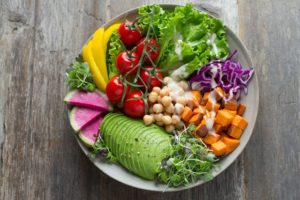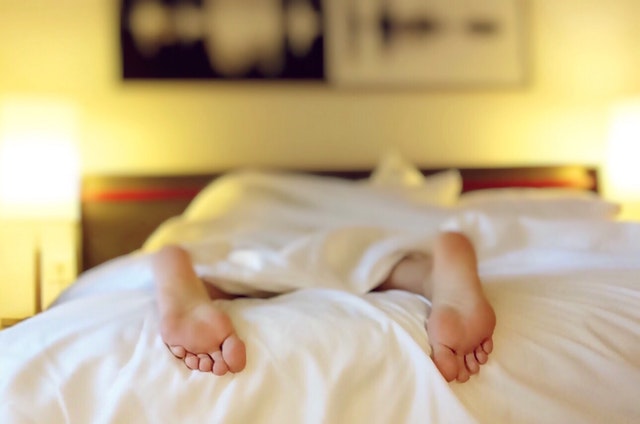
You might have noticed that if you have indigestion, you don’t sleep well.
And if you don’t sleep well, your digestion is often worse the next day…
Not only that, you are tired so have less energy and inclination to eat right, and that makes things worse…and so the cycle begins.
Yup, we’ve been there.
And when sleep is bad, it effects every area of our lives – which is why it is one of the 5 elements of the Zenith Method for optimum health and wellness.
Sleep solutions!
It turns out that there are several powerful and effective tactics we can apply to ensure our gut is as happy as possible in the evenings.
In this post, I give 5 easy-yet-awesome ways to avoid digestive pitfalls and make sure you’re as comfortable and ready for sleep as possible when the evening draws in…
But first, let’s take a deep dive into the surprising connection between digestion and sleep.
Does digestion affect sleep?

There have been many scientific studies that show that if you have digestive issues then you are much more likely to have disturbed sleep.
Difficulty in falling asleep, shorter sleep time, frequent waking up, or non-restorative sleep are the most common manifestations.
One study found that 72% of people with IBS had poor sleep!
If you have digestive issues and sleep issues, you’re also more likely to have low mood or depression. If this resonates with you and it is currently untreated, then perhaps it’s worth giving your physician a call.
Digestive issues are keeping you awake? You are definitely not alone!
Does poor sleep affect digestion?
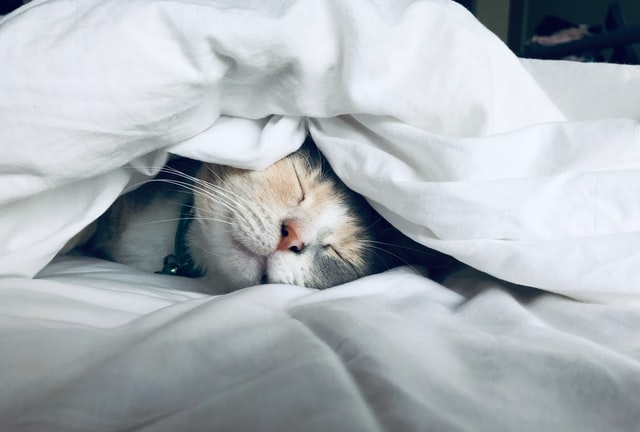
It also works the other way around – poor sleep can also affect digestion.
This can happen by messing up our satiety regulation. This is our feeling of fullness at the end of a meal that allows us to quite happily stop eating. It’s our brain’s clever way of stopping us gaining weight.
Lack of quality sleep can also increase our ghrelin secretion. Ghrelin is the hormone that makes us feel hungry! Just one bad night can up our ghrelin. Read more from Anandi, The Sleep Guru here.
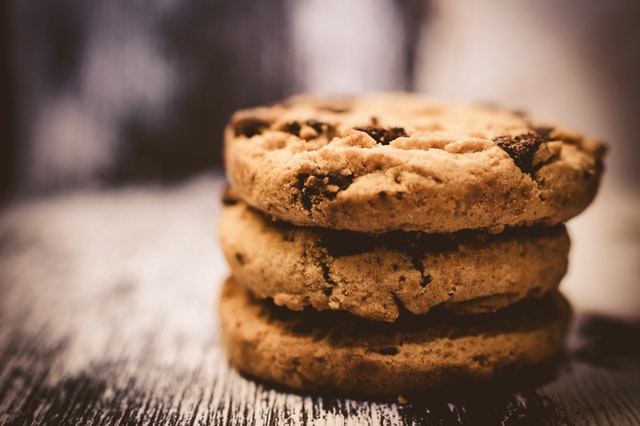
A bad night will also lower our control of our impulses, meaning that if we see cookies and want cookies, we have cookies.
Sleep and our microbiome
A poor nights sleep will also affect the balance of our gut microbes. Properly balanced gut microbes are so crucial for our overall wellbeing, it’s almost impossible to overstate.
There is preliminary evidence that too little sleep tips the balance of bacterial strains in favour of ones that are associated with weight gain and obesity.
The link between our gut microbiom and sleep is very poorly understood at the moment, but sleep legend Prof. Matt Walker has speculated that it might involve that mysterious but very cool nerve – the vagus.
I think the pathway [by which the microbiome influences sleep] is via a bunch of nerve fibres running between the gut and brain called the vagus nerve – and this is why there is a very powerful brain-gut relationship. If that is true then flip the equation: could the gut microbiome be a path through which we can reverse-engineer a signal for better sleep.
Prof Matthew Walker, Author of ‘Why we sleep’
Exciting times ahead!
And in the meantime, we can work on keeping our gut microbes balanced – always a good thing! See tip 1 below.
Why does digestion affect sleep?
Although exactly how digestion affects sleep is not fully understood, one thing we do know is that any sort of physical discomfort – such as indigestion – will make it worse.

There is also evidence that the regular ebb and flow of body processes that happens during the 24h day/night cycle (AKA ‘circadian rhythms’) are disrupted by digestive issues.
These patterns are like waves that rise and fall at different times of the day and night. They interweave with each other to create perfectly alert wakefulness or deep, restful ‘sleepfulness’. The particular timing and patterns of these rhythms also determine our ‘chronotype’.
A chrono-what?
As a reminder, your CHRONOTYPE is identified by the times during the day…
- when you get hungry
- when you usually eat your meals
- what bed time works for you
- the period in the night when you get your deepest sleep
- patterns of melatonin secretion (melatonin is a hormone secreted at bed time that tells your brain it’s time to sleep – and stay asleep – until morning).

Around 30% are true Night Owls, 30% are true Larks and the rest of us are somewhere in between.
See ‘Sleep Ambassador’ Prof Matt Walker explain chronotypes beautifully here.
Addicted owls?
An interesting study has shown that the Night Owl chronotype is also more prone to what is often called ‘food addiction’ – that is a tendency to develop persistent cravings for moreish processed food (technically called ‘highly palatable’, but basically means things like pizza, burger and fries, doughnuts, crisps/chips, ice cream, cookies).
Learn more about food addiction from this Ted talk by the fierce force for good that is Dr. Pam Peeke .
‘Night owls’ are more likely to have insomnia – and food addiction
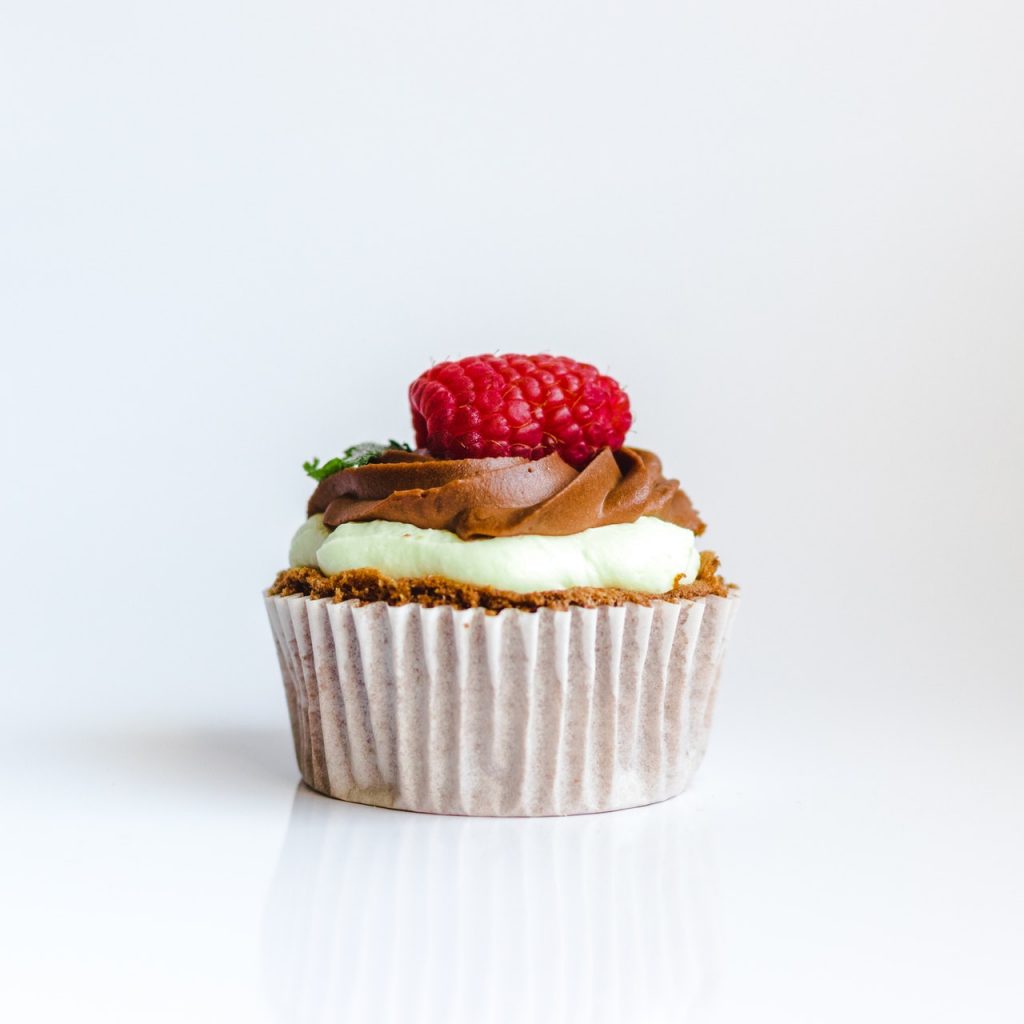
Something to bear in mind if your chronotype is a night owl [in other words, you find that late evening is ‘your time’ when you’re at your best and most productive], then you are more likely to struggle with sleep.
If this is you – then there is even more reason to follow closely the 5 super-simple ways to improve sleep I give below.
What’s your Ayurvedic sleep type?
There is a much older system of sleep types – thousands of years older, in fact! The ancient health system of Ayurveda takes an integrated approach to all aspects of life and heath – and sleep.
According to Anandi, the sleep guru, an internationally renowned speaker and expert on Ayurvedic sleep types, there is a super-important link between gut health and sleep. And as Anandi talks about here, stress affects both digestion and sleep.
Our stressful lifestyle affects the delicate balance of our gut health. If your gut is unhappy and your digestion is compromised, it will affect the quality of your sleep.
Anandi, The Sleep Guru
She has developed an ingenious system called ‘Sleepology‘ that takes a holistic approach to severe sleep issues.
The Sleep Guru blog has lots of information and tips – both for chronic, severe insomniacs and those of us who just need a bit of guidance.
Find out your sleep type with Anandi’s fun quiz here.
‘Falling’ asleep is a misnomer
It sounds so simple, doesn’t it? ‘Falling’ asleep – as if it’s a simple process.
In fact, the transition from being fully alert to being asleep is more of a journey than a switch. It involves a complicated and intricate set of sequential stages that your brain goes through.
This sequence is vulnerable to disruption by many things, including the physical discomfort that often accompanies digestive issues – and the altered stress hormones that can be driven by unbalanced digestion.
What happens to digestion when we sleep?
When we’re asleep, our digestion slows right down. It is still working, but at a much slower pace, especially during our deepest stages of sleep.
For those of you outside the UK who can buy melatonin supplements and use them to help you sleep, it’s worth bearing in mind that science suggests that low doses of melatonin speed up transit time of food through the gut (this is good for people with SIBO), but high doses slow down transit.
Perhaps slightly change your dose and see if it helps.

‘Eat to sleep‘
5 super-simple solutions
The great news is that there are solutions – when applied consistently – that help. Based on the Zenith Method Elements, here are my top 5 most effective tips to “eat for sleep”.
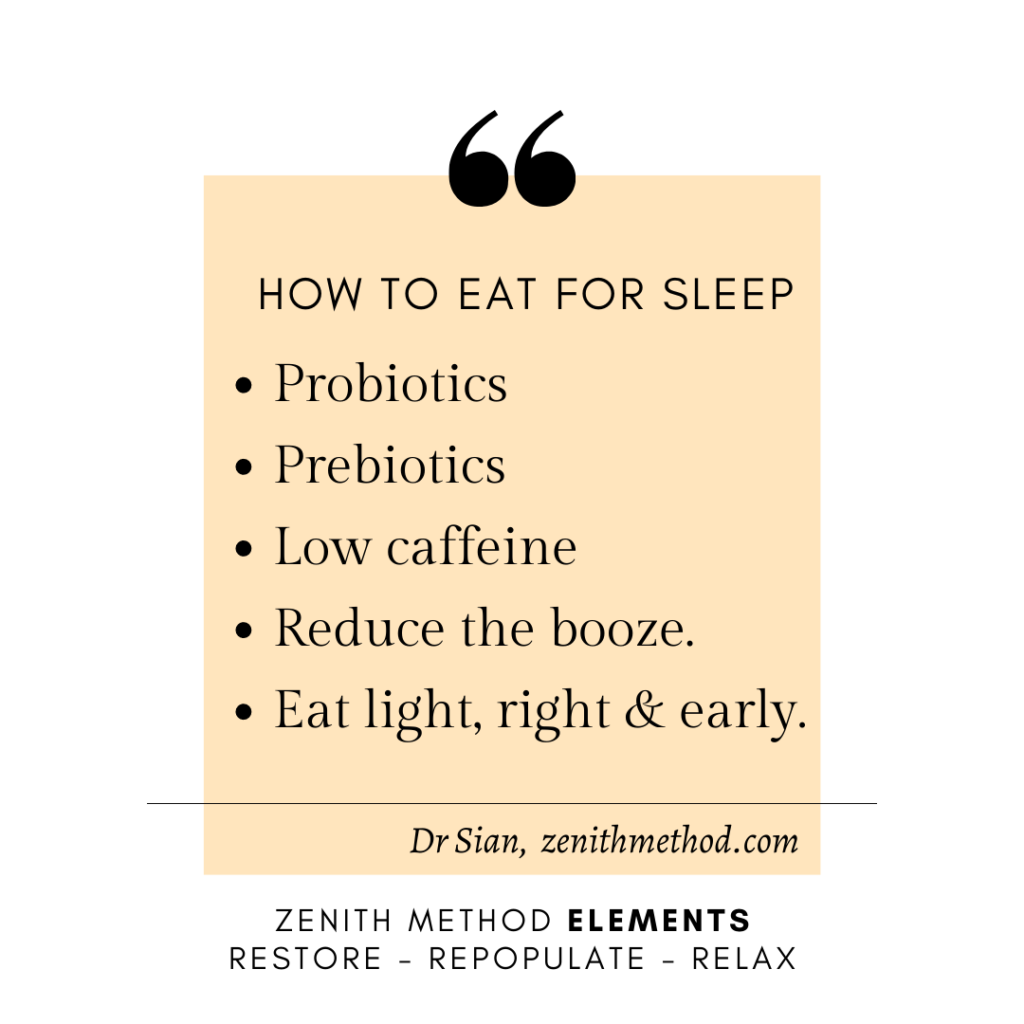
1. Probiotics
Most of us have come across the ‘gut microbiome’ by now – it’s definitely a trending topic! It refers to the trillions of microbes (a ‘microbial ecosystem’) that live in our large intestine and release a whole range of substances that keep us healthy. For a primer on the gut microbiome, see Dr Axe’s post here.
It turns out that taking broad-spectrum probiotics containing Lactobacillus and Bifidobacterium strains can repopulate your gut with loads of good microbes and can help with sleep – and also mood.
Perhaps the sceptic in you is thinking “gut bacteria can affect mood and sleep. Yeah, right”.
This is completely understandable. But researchers have discovered that our gut microbes consume the bits of our diet that we can’t digest (fibre) and use this to make a host of bioactive substances that can cross into our bloodstream and are beneficial for our body and brain. Read more here.

The details aren’t all worked out yet, and boy, it is complex. But all we need to know is that we need to keep our microbiome happy and balanced.
An easy way to keep gut microbes balanced is to take probiotics regularly – ideally, daily.
ZENITH METHOD
ELEMENT 3. REPOPULATE
My favourite brand is Garden of Life Primal Defense Ultra. I find this is great for IBS because it also includes the anti-inflammatory yeast Saccharomyces boulardii and various soil-based organisms. Buy here or on Amazon.
If you have good digestion but poor sleep, then try Bio-Kult, which just has Lactobacillus and Bifido strains.
Take with lunch or dinner (it’s important to take probiotics with food).
2. Prebiotics
Prebiotics are particular carbohydrates that gut microbes love to eat, and so consuming them encourages the growth of abundant ‘good bacteria’, thus promoting a balanced and healthy microbiome.
The most well known of these is probably inulin, which you can buy as a powder and add to almost anything. Oats are a great source of prebiotic fibres, and porridge makes a great breakfast – or evening snack – that can support good sleep through keeping your microbiome balanced.
Prebiotics are especially effective when combined with probiotics – but start with a low dose and work up. Some people find that taking the effect of pre and probiotics together on their digestion is, well, ‘strong’. The aim here is to improve digestion, so go easy on yourself. Start small and gradually build up.
3. No caffeine after noon
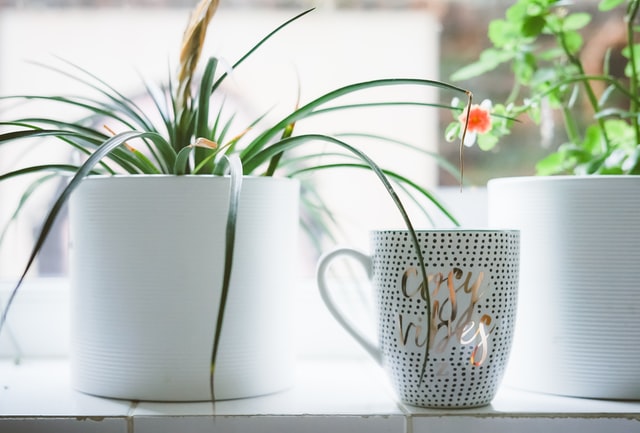
No surprises here, I know.
I could never give up my morning coffee. I think about it when I wake up and still look forward to it after decades of drinking the stuff…
But, this is the only coffee I have all day.
Seriously folks, even if you think it “isn’t a problem” for you, drop the coffee after midday and see what happens. Bear in mind that dark chocolate, tea and cola drinks also contain caffeine, so if these are on your afternoon and evening menu, then try limiting – or ideally substituting – them with rooibos tea [I love the Earl Grey one by Dragonfly teas] and have your dark chocolate fix mid morning.

I also like water-decaffeinated coffee as this has the least chemical residues. Although there is a little bit of caffeine left, I dont find it’s enough to affect me and I am very sensitive to caffeine – so this might also work for you.
According to research 60% of people in the US have genetics that mean they are slow to break down caffeine.

It seems we don’t need a genetic test to work this out – just think about how you feel a few hours after your last cup. If you’re crashing, you’re probably a fast metaboliser. If you’re still riding high, then you’re probably a slow metabolizer.
What happens when I cut down caffeine?
Because of the way caffeine works, it keeps you in a slight sleep debt. When you start reducing this, your brain will start to call in that debt – by making you feel tired.
Personally, I find I need one extra hour’s sleep for every cup of coffee I cut out. I have two cups in the morning, so if I have a caffeine-free day [which I do when my sleep goes out of kilter and I need to get it back], I will often need to have an afternoon nap or need to go to bed an hour or two earlier.

Then there is the caffeine withdrawal headache… You can minimise this by tapering – cutting down one cup of caffeinated beverage per day.
Painkillers like aspirin, paracetemol and ibuprofen (so called NSAIDs) irritate the gut lining and are reported to make leaky gut worse. So if you have chronic digestive issues, then try to avoid taking these painkillers if you can – or just take one to get you through the headache. I find these caffeine headaches don’t last long.
4. Reduce the booze…
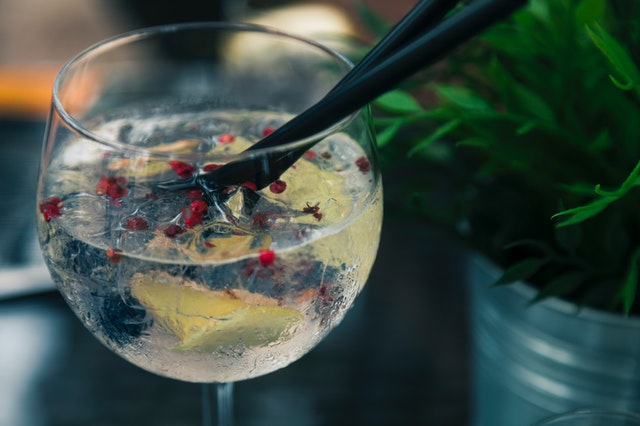
Ah, gin and tonic…a good shiraz… Heaven! Alcoholic drinks can mark the end of the work day, make us feel relaxed – help us to link to our ‘adult’ when we’ve spent the day in parent mode. But unfortunately, alcohol really doesn’t love us.
It irritates the gut lining, increases leaky gut, throws your gut bacteria off balance, interferes with absorption of certain essential nutrients – oh, and messes with the intricate interplay of brain chemicals and hormones that create restful and restorative sleep.
Like coffee, any suggestion of ‘giving up’ alcohol for good is unlikely to work unless you really want it to.
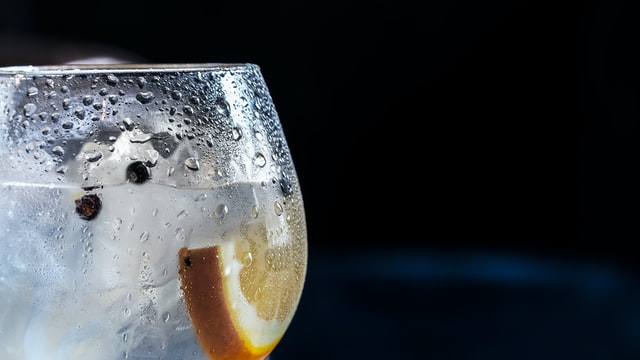
But would you consider a compromise? Perhaps limit yourself to a glass of wine with your evening meal a few times a week (a few more at weekends!) and have ‘posh’ sparkling water or kombucha (a sparkling, fermented tea-based drink – find it in health food stores) on the other days? Make sure you use a proper wine glass as this is part of your brain’s perception of the experience…!
5. Eat light. Eat right. Eat early.
What you eat for your evening meal, when you eat and how you eat all affect your sleep.
Meat and fat take longer to digest – up to 4 hours. Carbs and veg are quicker – and fruit is the quickest.
If you find that you either have indigestion that disrupts your sleep – or if you find that you are waking up in the night hungry, then make sure you eat a wholesome, low glycemic index (i.e. slow release) meal in the evening. This will keep you fuller for longer and stop those midnight hunger pangs!
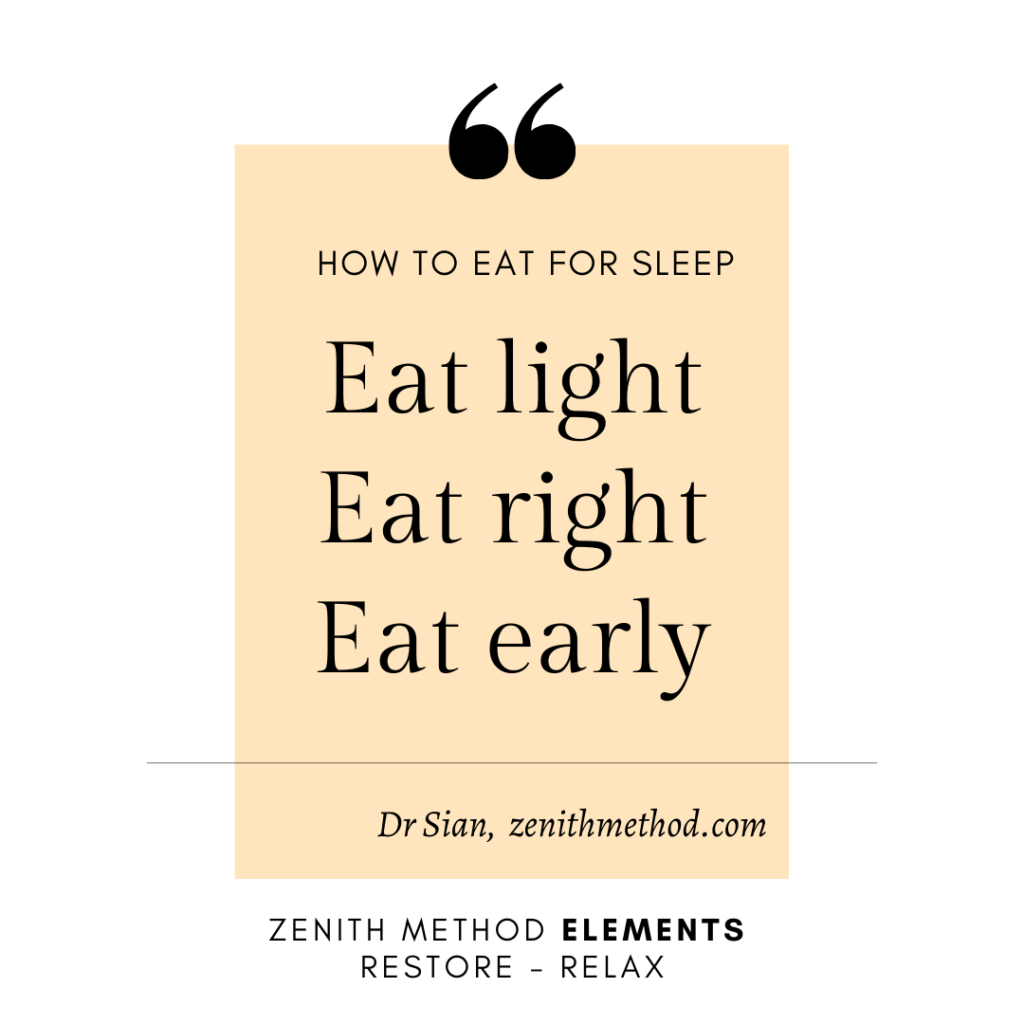
Eat light: eating your main meal at lunchtime and keeping the meal light in the evening can help with the ‘heavy’ feeling in the stomach that can stop us from sleeping well. Try avoiding meals high in meat and fat in the evening and see if this helps your sleep. Avoid high sugar foods, too, as they will spike your blood sugar -and cortisol – and mess up your sleep rhythms.
Eat right: If your blood sugar gets low, it can reduce sleep quality, so focus on slow-release wholegrains like brown rice or quinoa. Serve with fish or legumes and green vegetables.
Eat early: try not to eat anything for 4 hours before your bedtime (whatever this is for you depending on your chronotype). If you must eat later because you’re hungry and will find this distracting when you’re trying to sleep, try some light carb – perhaps a rice cake with nut butter.


